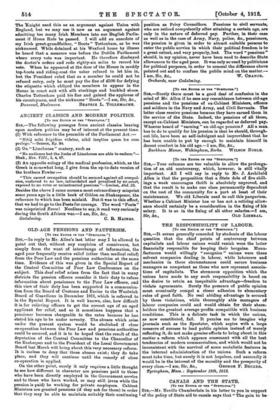OLD-AGE PENSIONS AND PAUPERISM.
[To THE EDITOR OP TEE "Sru-rAror."] SIN,—In reply to Mr. Allen's last letter may I be allowed to point out that, without any suspicion of connivance, but simply from the want of interchange of information, the aged poor frequently receive relief (other than medical relief) from the Poor Law and the pensions authorities at the same time. Evidence of this was given in the Special Report of the Central Committee of Poor Law Conferences on the subject. This dual relief arises from the fact that in many districts the pension officers consider it their duty to refuse information about pensioners to the Poor Law officers, and this view of their duty has been supported in a communica- tion from the Board of Customs and Excise to the Woolwich Board of Guardians in December 1911, which is referred to in the Special Report. It is well known, also, how difficult it is for relieving officers to get the correct age of an aged applicant for relief, and so it sometimes happens that a pensioner becomes chargeable to the rates because he has stated his age to be under seventy. The abuses which arise under the present system would be abolished if close co-operation between the Poor Law and pensions authorities could be secured, and it is to be hoped that the result of the deputation of the Central Committee to the Chancellor of the Exchequer and to the President of the Local Government Board last March will bring about this very necessary reform. It is useless to deny that these abuses exist; they do take place, and they will continue until the remedy of close co-operation is applied.
On the other point, surely it only requires a little thought to see how different in character are pensions paid to those who have been directly employed in the Government service and to those who have worked, or may still (even while the pension is paid) be working for private employers. Cabinet Ministers are granted pensions (if they ask for them) in order that they may be able to maintain suitably their continuing position as Privy Councillors. Pensions to civil servants, who are retired compulsorily after attaining a certain age, are only in the nature of deferred pay. Further, in their case as well as in the case of Army, Navy, police, &o., pensioners, the pension is given in order to attract suitable persons to enter the public service in which their political freedom is to a great extent, and very properly, lost. The word "pensions" should, in my opinion, never have been used to describe State allowances to the aged poor. It was only so used by politicians for political purposes, in order to conceal the difference above pointed out and to confuse the public mind on the matter.—


































































 Previous page
Previous page